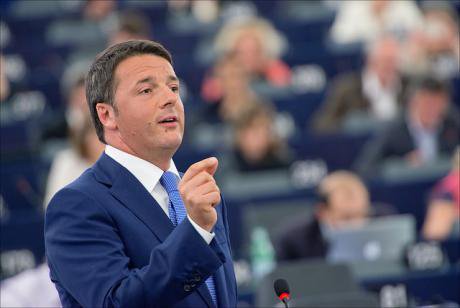
Matteo Renzi. Flickr/European Parliament. Some rights reserved.The Five Star Movement (M5S) is the real winner of the referendum on constitutional reforms that took place on Sunday 4 December in Italy and the Democratic Party (PD) is certainly the biggest loser. Yet their leaders – Matteo Renzi, the outgoing prime minister, and Beppe Grillo, the former comedian who established M5S – may need each other, paradoxically, in order to move beyond a political stalemate that poses a serious challenge to both their careers.
Matteo Renzi should, in fact, avoid the trap of an agreement between the PD and Silvio Berlusconi’s Forza Italia, who together may pursue electoral reforms, whose mechanisms would condemn the centre-left and the centre-right to govern together for the foreseeable future with the sole objective of keeping the M5S at bay. This situation could kill the entire agenda of a politician who has promised from the start to make a difference by scrapping (rottamare) the political elite – the bottleneck to any serious change.
Beppe Grillo would have the same interest. The biggest danger for him is a limbo in which his movement would be left to act as a permanent opposition, benefiting from the weaknesses of a coalition government but firmly trapped in the adolescence of a 'protest without a proposal', which over time may make M5S irrelevant to most citizens.
As of today Italy does not have the necessary legislation to regulate a general election
Once again, ever-changing electoral law is the cornerstone around which the search for a new government will be played. Shocking as it may seem to foreign observers, as of today Italy does not have the necessary legislation to regulate a general election. If parliament was dissolved without further action, it would have just two electoral laws: one would use a strongly majoritarian method for the Camera dei Deputati (the Upper House); the other a pure proportional mechanism for the Senate.
Before an election can take place, it will be necessary to choose one of these systems, or something that lies in between. In the case of a proportional mechanism, each of the three parties into which the Italian electorate has split – centre-left, M5S and centre-right – fall short of being able to win the majority of votes needed to have a government approved by both chambers.
This kind of stability may reassure financial markets in the short term and be beneficial for smaller parties. Yet it would be a disaster for Italy in the long-run and especially for the PD and M5S – the only parties which appear to have the votes and the will to transform the country, although in two opposite directions.
An alternative would be for Renzi and Grillo to adopt an electoral mechanism that assigns clear responsibilities and levers to whoever wins the election. For the M5S this will also imply a profound change in its approach to power. Indeed, its institutionalisation may become very interesting.
For the M5S this will also imply a profound change in its approach to power
Unlike the case of Trump, here in Italy we have, not a one-man band, but a movement of citizens characterised by new ways of engaging with the citizens themselves. And unlike the case of Marine Le Pen and UKIP – or at the opposite side of the spectrum, Podemos and Syriza – M5S moves beyond the categories of right and left to identify itself.
The challenge of transforming the M5S in order to transform Italy will be even greater than agreeing a compromise with its own arch-rival, Matteo Renzi. The alternative for the M5S, Renzi – and Italy – is to get stuck in the bog of a never ending decline.
Read more
Get our weekly email




Comments
We encourage anyone to comment, please consult the oD commenting guidelines if you have any questions.